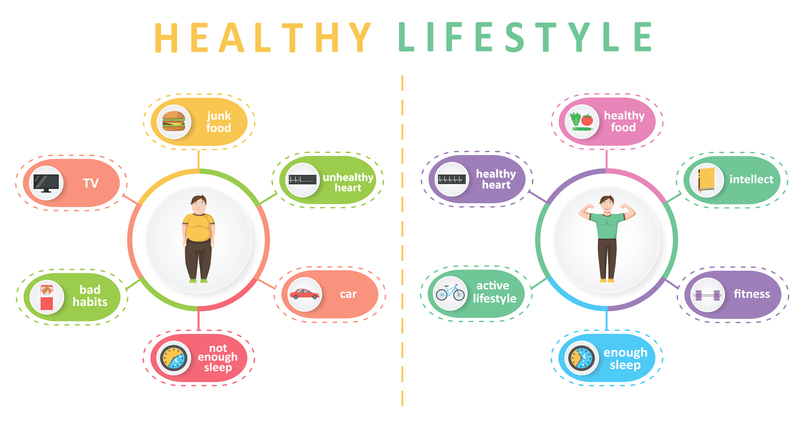The Coronavirus Wake-Up Call

One of the most difficult and painful aspects of the current SARS-CoV-2 (coronavirus or COVID-19) pandemic is having to accept that individually as well as a society, we could have done so much more to reduce the impact of this virus. Admittedly, our lifestyles have contributed to the underlying health conditions that greatly increase the risk of developing complications or even dying from this virus.
My fear is that by not making the effort to educate ourselves on how to stay well (and then not doing something with this knowledge), we have unwittingly and unintentionally put ourselves at a greater health risk than we otherwise would have been when confronted with a new pathogen such as the SARS-CoV-2 virus.
This pandemic is an important wake-up call that hopefully will motivate everyone to be more proactive about taking care of their health. Better efforts must be made to elevate the importance of wellness (reducing the likelihood of sickness). These efforts are just as important as finding a cure for diseases, because our public health system is not equipped to address even 10 percent of the population being acutely sick at the same time.

So what exactly are the underlying conditions that increase the risk of COVID-19 and other illnesses, for that matter? For starters, you need to know that they also happen to be the most common in our country. These are the conditions we can do something and be proactive about. They are:
Diabetes
It is estimated that more than 10 percent of the U.S. population has diabetes, representing more than 34 million Americans. Of these, some 7.3 million go undiagnosed, meaning the person does not even know they have this disease.
Another almost 90 million adults have pre-diabetes, with many of these people also not being aware of this condition or its risks. Diabetes weakens your immune system, especially if you are not adequately managing blood glucose levels, and makes it more difficult for your body to heal.
Having diabetes makes it two to three times more likely to progress with severe illness if you are infected with the new coronavirus. If you’re diabetic, make sure you are following your doctor’s orders on how to best manage your blood sugar levels.
If you’re not sure but think you may be diabetic (or at risk for developing it), your healthcare provider can do a simple test and also give you tips, including diet and exercise recommendations, to avoid developing diabetes.
Cardiovascular Disease
Alarmingly, almost half of all adults in the U.S. have some type of cardiovascular disease, according to the American Heart Association. Even though the new coronavirus primarily targets the lungs, people with heart disease have an elevated risk of developing complications from it since a diseased heart already has to work harder to do its job. If you add on the additional stress of fighting a virus, your heart may just simply give out. Also, heart disease can impact the ability of the immune system to do its job, which makes it harder for your body to fight off the coronavirus.
Hypertension is a common cardiovascular disease, impacting almost 30 percent of U.S. adults. Last, but not least, if you have plaque in your arteries, a viral infection could potentially cause some of it to break off and block the artery. This could result in a heart attack. In general, having any form of cardiovascular disease makes it two to three times more likely to progress with severe illness if you are infected with COVID-19.
As with diabetes, a healthy lifestyle including diet, weight management and exercise and not smoking (more on that below) are the recipe for helping to keep your heart and cardiovascular system healthy.
In addition to increasing your risk for a wide variety of health problems, including diabetes and cardiovascular disease, obesity, a condition affecting more than 42 percent of the U.S. population, also greatly increases your risk of developing complications from the new coronavirus.
This is because excess weight against your chest makes it harder for your diaphragm and other muscles to draw in a deep breath, and being overweight weakens your immune system. In one preliminary study of coronavirus disease progression, it was found that almost two-thirds of patients who develop severe complications are obese. Despite claims you may see on social media, there is no magic bullet for managing your weight. With regular physical activity and good nutrition from eating a healthy, primarily plant-based diet (under a doctor’s care, of course), you can achieve and maintain a healthy weight.
Poor Nutrition and Lack of Exercise
Given our collective penchant for fast and processed foods and aversion to fruits and vegetables (90 percent of adults and teens don’t get enough in their diets), it’s no surprise that most Americans’ nutritional needs are not being met. The result is that around half of American adults have one or more preventable diseases, many of which can be tied directly back to poor diets coupled with not getting enough exercise (these two often go hand-in-hand).
Also, not surprisingly, the underlying conditions that increase the risk of complications from coronavirus also can be caused or made worse by not getting the nutrients your body needs and in the right amounts. The best way to make sure you are getting, and that your body is absorbing, critical nutrients is to get a nutrient test.
The information it gives you can help you and an intelligent and aware healthcare provider make any dietary changes you may need as well as decide whether or not supplements would make sense for you. And, when it comes to exercise, according to the U.S. Centers for Disease Control and Prevention, we don’t fare much better than we do with nutrition, with less than 25 percent of Americans getting enough exercise.
Smoking is the leading cause of chronic obstructive pulmonary disorder (COPD), and data are showing that people with this condition can be up to 11 times more likely to get severely ill from coronavirus. So, if you ever needed a reason to quit smoking, this is a good one!
It’s important to keep in mind that all of these conditions work synergistically to increase your risk of developing complications from the coronavirus as well as from other infections. So, your risk may increase exponentially with each additional underlying condition you have.
Am I telling you all this to scare you and others? Not really, but if a little fear motivates everyone to think more about wellness and preventing disease rather than just assuming, “If I get sick, the doctors will fix me,” then we will all be better off individually and as a society. To give you an example of why this type of cavalier attitude toward illness is so risky, as you probably have read, the coronavirus pandemic is quickly leading to a situation where our hospitals and doctors will be overwhelmed. If this happens, then none of us - whether we show up at the ER with coronavirus or a heart attack – will get the urgent care we need. It’s up to us to make sure this does not happen.
Prevention is better than cure.
Stay healthy – we all depend on it!
Enjoy your healthy life!
The pH professional health care team includes recognized experts from a variety of health care and related disciplines, including physicians, attorneys, nutritionists, nurses and certified fitness instructors. This team also includes the members of the pH Medical Advisory Board, which constantly monitors all pH programs, products and services. To learn more about the pH Medical Advisory Board, click here.







